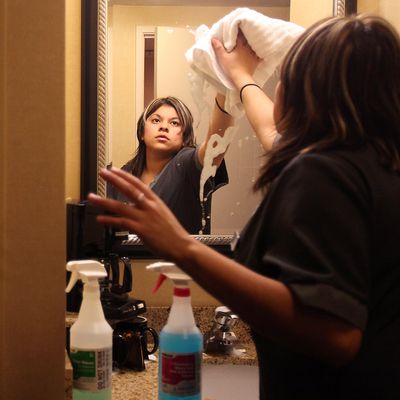
The hotel megachain Marriott and Maria Shriver have announced a campaign to get you to tip the person who cleans your hotel room. The sentiment seems good enough. Housekeeping is backbreaking but invisible service work, generally performed for low wages by women of color and immigrants, and often in hostile conditions. These are precisely the sorts of workers who could use a raise in this economy. But tipping is a terrible, terrible custom, and as such, this is a terrible, terrible way to shunt these workers a little more money.
The galling corporate feel-good effort is called “The Envelope Please,” and it has Marriott placing envelopes in 160,000 hotel rooms, reminding you that a human being tidies them up after you and suggesting that you leave a little something:
Shriver, who founded an organization called A Woman’s Nation that aims to empower women, says many travelers don’t realize tipping hotel room attendants is customary. “There’s a huge education of the traveler that needs to occur,” she said. “If you tell them, they ask, ‘How do I do that?’” She said envelopes make it easy for guests to leave cash for the right person in a secure way.
So how much should you leave? Marriott International CEO Arne Sorenson says $1 to $5 per night, depending on room rate, with more for a high-priced suite.
Why not chip in a few more bucks for a deserving worker at Marriott’s behest? For one, tipping introduces uncertainty to a worker’s income. Does a hotel housekeeper get to keep her tips, or does she have to pool them? What happens if her tips come in unusually high or low? What if the other housekeepers hide their tips, or forget to encourage guests to leave something? On top of that, tipping reduces the incentive for employers to raise wages. If our hotel worker wants more tips, why doesn’t she just work harder and clean more rooms?
Well, there’s evidence that working harder might not raise her tips at all. Here’s Brian Palmer on the phenomenon as related to tipping in restaurants:
Tipping does not incentivize hard work. The factors that correlate most strongly to tip size have virtually nothing to do with the quality of service. Credit card tips are larger than cash tips. Large parties with sizable bills leave disproportionately small tips. We tip servers more if they tell us their names, touch us on the arm, or draw smiley faces on our checks. Quality of service has a laughably small impact on tip size. According to a 2000 study, a customer’s assessment of the server’s work only accounts for between 1 and 5 percent of the variation in tips at a restaurant.
There’s heaps more evidence that tipping is arbitrary and in some cases discriminatory. Blondes make more tips. Servers with hair ornaments make more tips. One can only imagine that Marriott workers who took precious minutes to decorate their envelopes — smiley faces, free candies, a small watercolor produced in their spare time, perhaps — would make more tips, too, quality of their work aside.
As such, there has been a tremendous backlash against tipping in restaurants. So why introduce a new class of workers to the phenomenon at all? Contra Shriver and Marriott, tipping hotel-room attendants is not customary — at least not in the way that tipping a waiter, bellhop, or valet driver is. I never knew that anyone did it until recently. A hotel worker quoted in the above article reports that only one in 15 or 20 customers leave anything. Such workers are compensated with a standard hourly wage, not a tipped wage. Nor should it be customary. Hotel cleaners do a strenuous, difficult job. But hotel guests pay for that job when they pay for their room.
Marriott makes $13 billion a year in revenue, and $626 million in profits. Arne Sorenson — the guy who suggests you leave $1 or $5 a night, depending on rate — makes $7 million a year. If Marriott wants its housekeepers to earn more, it should pay them more, rather than blithely suggesting that their customers do it for them.





























